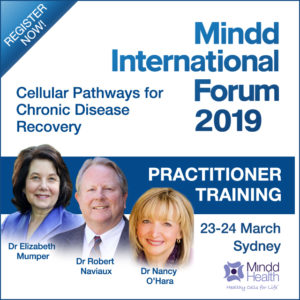The prevalence of conditions such as asthma, eczema and allergic rhinitis that make up the Allergic Triad, has increased dramatically in the past few decades.
Mindd International Forum, 23-24 March (Live in Sydney, Australia and Livestreaming globally)
Certified practitioners who pass the assessment will be listed at mindd.org. A certificate of completion will be provided for CPD applications.
It is vital to detect the underlying causes and triggers for these conditions, as they can often be dietary, lifestyle or environmentally related. There is also a significant link with immune dysregulation, which requires a proper understanding of the adaptive immune function and its relationship to gut health, to enhance its functionality.
Allergic Triad Presentation
One of Dr Elizabeth Mumper’s Presentations at the 2019 Mindd Forum will focus on the Allergic Triad, with a particular emphasis on the enhancement of the adaptive immune function of the gut to modulate immune balance.
Dr Mumper is president and CEO of The Rimland Center, a practice devoted to the care of children with neurodevelopmental problems. As the Medical Director of the Autism Research Institute for five years and an international lecturer, Dr Elizabeth Mumper’s Presentations at The Mindd International Forum 2019 will be insightful and educational.
What is the Allergic Triad?
The Allergic Triad also known as Atopic Conditions, refers to the genetic tendency to develop allergic conditions such as eczema, allergic rhinitis, and asthma. These atopic conditions are typically associated with heightened immune responses via the production of IgE antibodies as a result of exposure to common allergens in the environment or diet. Up to 40% of children with eczema experience a progression to asthma and rhinitis. This progression in atopic disease is also termed the “Atopic March.”
What is the Current Medical Treatment for these Conditions?
Allergic conditions such as rhinitis are generally treated with steroidal nasal sprays. While these can be effective, they rarely offer a long-term solution and are not addressing the underlying mechanisms. Eczema is often treated with topical steroids, antibiotics and sometimes cortisone injections. Anti-inflammatory drugs are also used to treat these conditions. Currently, there are no known interventions that can cure allergic inflammation, and management is based on the presentation of symptoms.
How can Integrative Medicine help?
Integrative medicine tends to tackle atopy slightly differently, as it explores the vital role of the microbiome in immune system development and homeostasis. Integrative medicine practitioners are likely to investigate any changes in microbial composition and any possible dysbiosis. This dysbiosis in the gut has been linked to alterations in the immune response and therefore to the development of immune-related conditions such as the Atopic March. Understanding the immunomodulatory effect of enhancing digestive function helps practitioners improve the adaptive capacity of the immune system which is required to treat the root cause of atopic conditions.
Learning objectives for Dr Mumper’s Presentation on the Allergic Triad:
- Understanding the prevalence of allergic rhinitis, asthma, and eczema as well as the relationship between them
- Identifying the underlying causes and triggers to these conditions
- Understanding the gut-immune connection and its role in atopic conditions
- Enhancing the adaptive function of the immune system
Dr Mumper’s Presentation lecture topics include:
- Alopecia, Vitiligo and Cutaneous Mastocytosis
- How Ages and Stages Affect Migraines
- Unlocking the Allergic Triad (Allergic Rhinitis, Asthma, Eczema)
- Why Cerebral Folate Deficiency & Folate Antibodies are Important
- ASIA (Autoimmunity Syndrome Induced by Adjuvants)
- Autoimmunity







